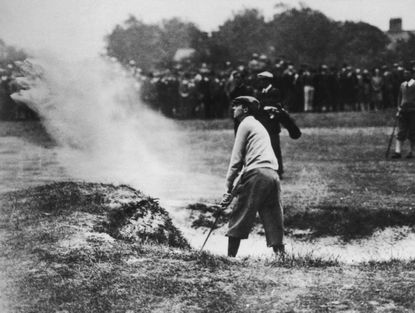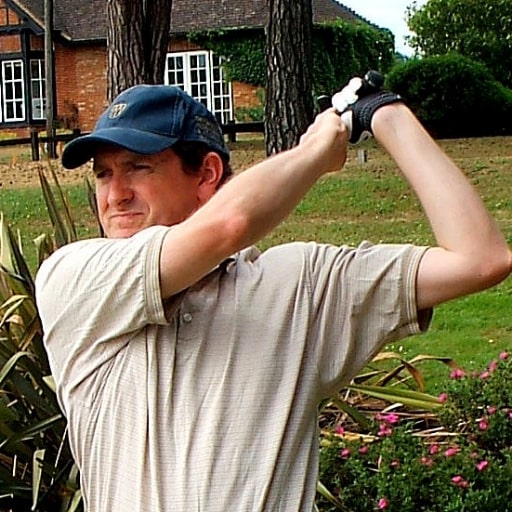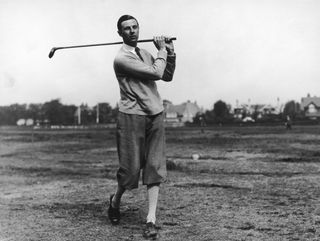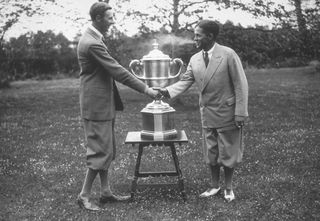Roger Wethered - the lesser known brother


Joyce Wethered's brother Roger was a champion golfer in his own right, a Walker Cup player and captain of the R&A and oh so nearly an amateur Open Champion
Joyce Wethered may be the most famous golfing member of the Wethered family - and in some people’s eyes the finest woman’s golfer ever - but her brother, Roger was himself a champion golfer.
Indeed, were it not for a bizarre rules infringement, Roger would have become the last amateur to win The Open Championship.
Roger and Joyce’s father was a keen golfer, a six-handicapper who wrote books on golf. The game was part of their upbringing and the family had a house overlooking Royal Dornoch.
However Roger was a sickly child, and had to be home schooled as a result. Yet he was fit enough to be called up in 1918 to join the Royal Artillery. Upon being demobbed he went up to Oxford University, playing for the university golf team and graduating in 1921 with a degree in English.
He was to win the President’s Putter five times. The strength of his game was in his iron play. His driving was less reliable, although it improved during his career.
He entered the Open Championship of 1921 at St Andrews. In the third round on the 14th hole he walked forwards to get a better sightline and then walked backwards. He must have lost his bearings for he accidentally trod on his ball in doing so, incurring a shot penalty.
Get the Golf Monthly Newsletter
Subscribe to the Golf Monthly newsletter to stay up to date with all the latest tour news, equipment news, reviews, head-to-heads and buyer’s guides from our team of experienced experts.

This penalty was to cost him victory as he ended in a play-off with Jock Hutchison. Wethered initially said he could not take in the 36-hole play-off the next day as he had agreed to play in a cricket match, but was persuaded to change his mind.
No amateur had won the Open Championship since Harold Hilton, founder of Golf Monthly, won the 1897 edition. However Wethered lost the play-off by nine strokes, with rounds of 77 and 82 to Hutchison’s 74 and 76.
Roger Wethered won the Amateur Championship in 1923 at Royal Cinque ports. He won the 36-hole match 7&6.
His sister, who had been knocked out in the semi-final of the Ladies Amateur Golf Championship at Bernham and Berrow, had driven through the night to support her brother in the final. Joyce and Roger also co-authored a book called The Game of Golf.
Roger Wethered lost in the semi-finals of the following year’s Amateur Championship, as he also did in 1927. In 1928 he got to the final but lost - as he did in 1930. His final defeats came as 6&4 and 7&6.
Roger played in the first Walker Cup match, and was to play in it five times, including as captain in 1930. In that first Walker Cup Great Britain & Ireland lost, but Wethered won his foursomes match 5&4, then beat the great Bobby Jones 3&2 in the singles.

Jones got his revenge though when they were opposing captains in 1930. After Wethered won his foursomes match 2 up, he crashed to Bobby Jones 9&8 in singles. The US won that Walker Cup 10-2.
Roger Wethered was elected captain of the R&A in 1939, only assuming office in 1946.
He worked as a stockbroker in London and lived in Wimbledon. He was a member of Royal Wimbledon and aged 74 went round its course in 74 shots.
Contributing Writer Golf courses and travel are Roderick’s particular interests and he was contributing editor for the first few years of the Golf Monthly Travel Supplement. He writes travel articles and general features for the magazine, travel supplement and website. He also compiles the magazine's crossword. He is a member of Trevose Golf & Country Club and has played golf in around two dozen countries. Cricket is his other main sporting love. He is the author of five books, four of which are still in print: The Novel Life of PG Wodehouse; The Don: Beyond Boundaries; Wally Hammond: Gentleman & Player and England’s Greatest Post-War All Rounder.
-
 'I Think 100 Is My Finishing Line' - Angela Stanford Suggests Retirement Is Close Ahead Of 98th Consecutive Major
'I Think 100 Is My Finishing Line' - Angela Stanford Suggests Retirement Is Close Ahead Of 98th Consecutive MajorThe 2018 Evian Championship winner is playing her 98th consecutive Major at the Chevron Championship this week aged 46
By Jonny Leighfield Published
-
 'Gator Netting Is In Place' - Chevron Championship Venue Prepared For 'Safe' Winner's Jump
'Gator Netting Is In Place' - Chevron Championship Venue Prepared For 'Safe' Winner's JumpA tradition which began at the tournament's previous home could continue this year - if the champion is feeling brave enough...
By Jonny Leighfield Published